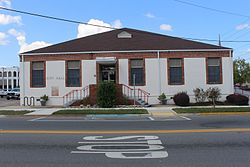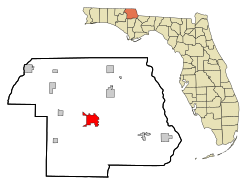Marianna, Florida
| Marianna, Florida | |
|---|---|
| City | |

Marianna City Hall
|
|
| Motto: "City Of Southern Charm " | |
 Location in Jackson County and the state of Florida |
|
| Coordinates: 30°46′35″N 85°14′17″W / 30.77639°N 85.23806°WCoordinates: 30°46′35″N 85°14′17″W / 30.77639°N 85.23806°W | |
| Country |
|
| State |
|
| County | Jackson |
| Area | |
| • Total | 8 sq mi (20.9 km2) |
| • Land | 8 sq mi (20.8 km2) |
| • Water | 0 sq mi (0.1 km2) |
| Elevation | 167 ft (51 m) |
| Population (2012) | |
| • Total | 9,094 |
| • Density | 778.8/sq mi (298.1/km2) |
| Time zone | Central (CST) (UTC-6) |
| • Summer (DST) | CDT (UTC-5) |
| ZIP codes | 32446-32448 |
| Area code(s) | 850 |
| FIPS code | 12-43175 |
| GNIS feature ID | 0286422 |
| Website | www.cityofmarianna.com |
Marianna is a city in Jackson County, Florida, United States. The population was 6,230 at the 2000 census. It is the county seat of Jackson County and is home to Chipola College. The official nickname of Marianna is "The City of Southern Charm."
Marianna was founded in 1828 by Scottish entrepreneur Scott Beverege and named the town after his wife, Mary and her friend Anna combining their names to form Marianna, it was named the county seat the following year, supplanting the earlier settlement of Webbville, which soon dissolved and no longer exists. Marianna was platted along the Chipola River and many plantation owners from North Carolina relocated to Jackson County for the fertile soil.
It is the final resting place of the Confederate governor of Florida, Governor John Milton, and the scene of a Civil War battle between a small home guard of about 150 boys, older men, and wounded soldiers, and a contingent of approximately 700 Federal troops.
Governor Milton owned Sylvania Plantation and hundreds of slaves, was the governor of Florida during the Civil War years. Governor Milton was vehemently against the Confederate States of America reuniting with the United States of America. He vowed that he would rather die than see the Confederates reunite with the Unionist states.
In late spring 1865, as federal troops were preparing to take control of Tallahassee, Governor Milton received word the Civil War had ended and that Florida would, once again, be part of the United States. On April 1, 1865, as the southern cause was collapsing, John Milton shot himself at "Sylvania." In his last message to the legislature, he had said, "Death would be preferable to reunion."
Marianna was also the site of the 1934 brutal torture and lynching of Claude Neal, an African American man accused of rape and murder. The national publicity generated by the lynching, and resulting protests, played a significant role in the history of the United States by helping to inspire national anti-lynching laws. After the lynching there were race riots when the KKK tried to eliminate all residents of Mariana who were identified as Black. The six vigilantes that led the lynching remain unnamed.
...
Wikipedia
